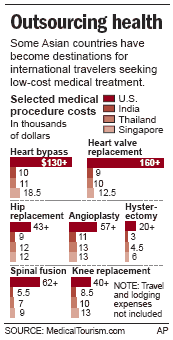 With testimonials, press coverage, and costs like these, the new global era of health care has arrived.
With testimonials, press coverage, and costs like these, the new global era of health care has arrived.Dodie Gilmore is a spry 60-year-old who loves the outdoors, but when she could no longer straddle her faithful horse, River, she knew it was time for a new hip.And Coldwell Banker is not the only one thinking about this arrangement:
But how could she afford it? As an independent contractor for a small Coldwell Banker real estate franchise in Durant, Okla., she knew her privately purchased health plan would never pay up to $40,000 for the operation.
So she asked her boss about traveling to India where hip resurfacing alone would cost just $7,000. He not only gave her his blessing but offered to foot the bill, minus travel and hotels — making Gilmore one of the very first Americans sent overseas for surgery by an employer.
United Group Programs, a Boca Raton, Fla.-based company that sells self-insurance policies to small businesses, is already offering a plan that sends patients to Bumrungrad International hospital in Bangkok, Thailand. UGP says the plan will save employers more than 50 percent on major medical costs and slash employees’ out-of-pocket expenses to zero.Non-union employees seem particularly vulnerable (or fortunate, depending on which side of the debate you favor). But when United Steelworkers union blocked a North Carolina employee of Blue Ridge Paper Products in Canton, N.C. from receiving a gall bladder resection in India, they exposed an contentious issue:
Blue Shield of California and Health Net of California also both offer lower-cost policies allowing members to seek medical care in Mexico.
In June, David Boucher, an assistant vice president at BlueCross BlueShield of South Carolina, traveled to Bangkok for a close-up look at Bumrungrad. The Thai hospital began heavily recruiting overseas patients after the 1997 Asian financial crisis. It drew 400,000 foreigners last year — including 55,000 Americans.
“I was thoroughly impressed,” Boucher said. “We’re taking a serious look at this as an alternative” for the health plan’s 1.5 million members.
The union’s resistance has brought to the fore a critical question in the path of the globalization of the health care industry — who is liable if something goes wrong in an overseas hospital? And underlying all this is the even more explosive issue of potential job losses in the American health care industry, in an economy already sensitive to the large-scale shift of jobs to cheaper overseas locations.I have a feeling I know who will win this battle. It's a dog-eat-dog world out there, isn't it?
Now for the controversy: should we be training our physician competitors?
-Wes
i was in training more recently than you. whether we should or not train our physician competitors- i think we should since our focus is on best health care for patients first. there are plenty of patients to go around.
ReplyDeletewhat i was disappointed to see at the three institutions where i trained was a fear (that was discussed in front of me at all places) that training us grads would place the institution at higher risk for decreasing volumes since the us grads had a tendency to set up shop right around the university. quite disappointing but i suppose not a surprise given the commercialization of academic medicine.
who will we have left to train?
i just want you to help me my giving your review about any hotel you visied in INDIA or any of ur frnds 8
ReplyDeletewww.indiahotelreview.com